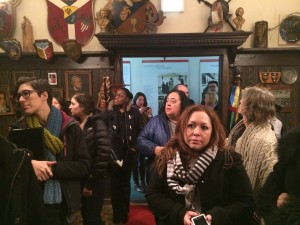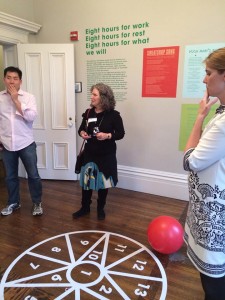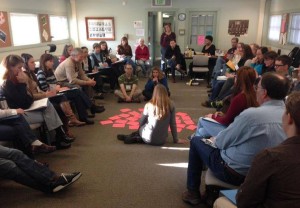Guest Post by Sarah Pharon, Senior Director, Methodology and Practice, International Coalition of Sites of Conscience
I travel frequently for my work. I spend more time than I would like at airports eating an embarrassing amount of “bad food” from food courts. While waiting for my order from one of the airport fast food chains a few months back, I noticed an LED sign broadcasting the “average customer wait time.” This, like many restaurants of its ilk, was one where success was evaluated by speed of service or to put it another way, immediate responsiveness to customer need. In today’s quick-moving world, what if museums were to consider our “rate of responsiveness” as an indicator of our overall success?

National Dialogues on Immigration, a Coalition project, visiting the Haitian American Museum of Chicago. Courtesy ICSC
Rather than providing rapid service or even reasonably quick service, museums have become an “hours long, lingering over four courses with palate cleansers in between” type of meal. We plan and research and design and sometimes evaluate and though the final product often tastes delicious, our visitors cannot afford to eat that way every day and we couldn’t satisfy their appetite with new menu items even if they wanted us to.
As the events of Ferguson, Missouri unfolded in August of 2014, the country was forced to reckon with questions of race, community policing, and civil servant safety. While the protests continued, when debate across America was reaching a fevered pitch, we who profess to be active community “forums” were conspicuously quiet “temples.” Though a smattering of individual institutions responded with social media posts or community programs, the response time across our profession was dismal.
Soon after the grand jury decided not to indict a New York City police officer in the death of Eric Garner, I began to receive emails at my desk at the International Coalition of Sites of Conscience, a worldwide network of over 200 places of memory in 55 countries dedicated to remembering past struggles for justice and addressing their contemporary legacies. Museum professionals across the globe asked what our member Sites might suggest to institutions struggling to find their voice in the midst of such hotly politicized debate. More specifically, they wanted me to explain where we were as an organization – why weren’t we in the conversation?
Over the past 15 years, the Coalition has witnessed and been part of a movement among the world’s museums and historic sites to assist visitors in connecting events of the past with their daily lives. Museums continue to increase overall contemporary relevancy, better serve our communities and execute fearless programming, but quickly respond to immediate need? We’re planners. We don’t necessarily work well on the fly.

National Dialogues on Immigration, a Coalition project, visiting the DANK Haus German American Cultural Center in Chicago. Courtesy ICSC
Since we are institutions that like to plan – here’s what we can do in the long term to help make our Sites safe spaces for our communities to come together:
- We need to make sure that our staff members are trained to serve as community facilitators well in advance of an “event.” The Coalition, along with other organizations, offers facilitated dialogue training. You can learn more here.
- We must establish and more importantly, do the hard work of maintaining community partnerships so that we are trusted to hold such conversations and so that publicity can quickly reach intended audiences.
- We must create annual budgets which carve out “wiggle room” that allow us to be nimble in hosting responsive programs.
- We must set aside time in our work plans to select artifacts, oral histories, and moments in the historical record which show particular promise in helping our visitors connect past to present around the pressing social issues of our time.
- We must talk to our Boards, our funders, and other community stakeholders about our desire to serve as facilitators so everyone is aware of our need to act quickly during critical moments. By having these conversations from the onset, we will not have to wait to get the green light.
Such efforts will create a climate that will enable us to be flexible and more immediately responsive. We have to be willing to free up time in our busy calendars so that we can quickly develop programs, push forward with publicity, and most importantly open our doors when our community needs us to serve as forum.

The Coalition conducting a dialogue training with staff of Rocky Mountain National Park credit. Courtesy ICSC
To assist in this effort, the Coalition recently premiered Front Page Dialogues, dialogue guides developed to assist our sites in responding to events which have prompted worldwide discussion and where our unique context as sites of memory might help ground the conversation. Front Page Dialogues is intended and designed for use at museums and historic sites, but we hope that it may prove to be a useful tool across fields. We premiered this series with a dialogue guide on Ebola in December, and followed up with a dialogue guide on Charlie Hebdo in January. Our commitment to the field is to create these dialogue guides within 2-3 days of similar incidents, when it becomes apparent that an issue has galvanized interest from across the globe. This effort is still new for us and we are eager to get input from the field; let us know if you find them useful and if you have suggestions for how they can be more helpful to you as you craft community dialogues of your own.
Together, I’m sure we can take steps to reduce our “average customer wait time” and create even more meaning for our institutions of culture and learning.
For more information about the International Coalition of Sites of Conscience, membership or our trainings, please visit www.sitesofconscience.org or email the author at spharaon@sitesofconscience.org.
Pingback: Museums and Politics: #ReturnKatsinaFriends | Talking About Tough Stuff